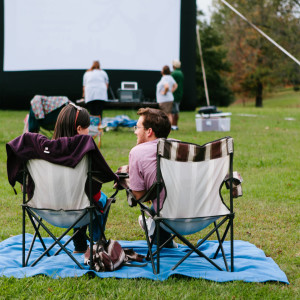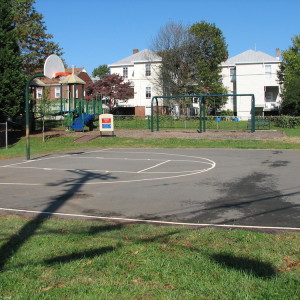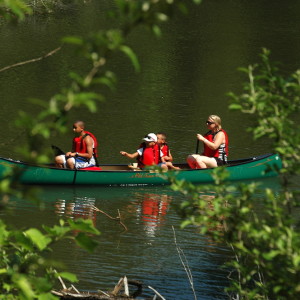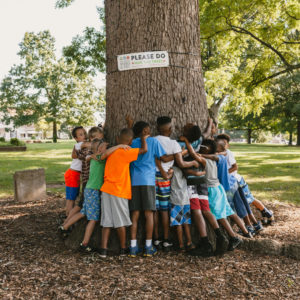Respectfully Submitted: Jennifer Jones, Director Lynchburg Parks and Recreation Department
Parks and Recreation is an essential city function that provides countless value to our citizens. It is easy to take these benefits for granted. I thought I would take a minute to highlight some of the quality of life advantages that are often overlooked. Here is a list of what I think are the Top 5 benefits of Parks and Recreation.
 Public parks provide millions of Americans with the opportunity to be physically active.
Public parks provide millions of Americans with the opportunity to be physically active.
Physical activity is a major combatant against the epidemic of obesity. Whether it is active recreation pursuits like athletic leagues, fitness and dance programs, trails and active amenities like playgrounds and pools, our parks provide natural locations for organized physical activities, as well as unstructured spaces that overtly or subtlety encourage physical activity. Providing appropriate park infrastructure is a key component in a parks and recreation department’s ability to improve the physical fitness of a community. Read more.
 Parks provide vital green space.
Parks provide vital green space.
People go to parks to improve their mood and reinvigorate themselves. One longitudinal study showed that individuals who move to greener areas have significant and long-lasting improvements in mental health. Another study showed that greener environments enhance recovery from surgery, enable and support higher levels of physical activity, improve immune system functioning, and help diabetics achieve healthier blood glucose levels. Passive leisure activities in parks like reading and contemplation improve mood, reduce stress and enhance a sense of wellness. The ability of green spaces (think Blackwater Creek Trail) to significantly improve the physical and mental health of it citizens is a cornerstone by which communities improve the quality of life.
 True economic benefits are generated via public parks.
True economic benefits are generated via public parks.
Public parks increase property value of residential properties immediately adjacent to parks by as much as 20% of the properties’ marginal value – especially if the park is a natural area. The economic impact that large tournaments, competitions and special events hosted in public parks bring to the local economy can offset park maintenance operating budgets which are normally thought of as totally subsidized high-cost centers. Having destination attractions in parks such as exhibits, museums, river sports put-ins, and state-of-the-art play spaces also attract tourist dollars to our area. *
 Parks conserve natural areas and important wetlands as well as preserve critical wildlife habitats.
Parks conserve natural areas and important wetlands as well as preserve critical wildlife habitats.
Protecting trees is especially important as they clean the air we breathe and provide shade. It is estimated that U.S. urban trees alone remove 75,000 tons of air pollutants annually. Conservation needs to be done by humans to prevent damage caused by humans. Conservation means a lot to the local and global community because without it, ecosystems would fall apart due to short-sighted development while animals could become endangered or extinct like jellyfish, Monarch butterflies, wasps, starfish, bees, and cod. Learn more.
 Community recreation social programs and services improve the human condition of those experiencing barriers that limit their opportunities.
Community recreation social programs and services improve the human condition of those experiencing barriers that limit their opportunities.
Our after-school and drop-in programs provide a refuge of safety for at-risk youth. Researchers concur that crimes by and against minors soar from 3-6pm (after school lets out). According to a 2010 study, for every dollar spent in afterschool programming, it saved on average $6 in crime, court and detention costs. This is why great summer camps, open gym, and afterschool programs in our neighborhood centers are an effective and essential human service. Doesn’t it make more sense to be proactive rather than reactive, especially when study after study bear out the importance of afterschool care? Community recreation programs provide a social outlet and a way to connect people. Consider that loneliness has become an epidemic. “Social isolation is as potent as smoking 15 cigarettes a day”; loneliness, research suggests is twice as deadly as obesity. Dementia, high blood pressure, alcoholism, and accidents – all these health issues become more prevalent when connections are cut. We cannot cope alone.” Providing programs and public spaces like Templeton Senior Center for human interaction are important. Community recreation programs and parks also provide for social equity, ensuring that all citizens have access and opportunity to benefit from parks and recreation services by removing barriers. Handicapped-accessible facilities, affordable programming, and direct mailed program guides are all examples of the City of Lynchburg leaders’ effort to make Lynchburg a great place to live, work and play for all people.
Lynchburg Parks and Recreation Department is uniquely situated to provide crucial benefits to our citizens. Our parks and neighborhood centers are public commons and are often the glue that brings and holds the community together. Lynchburg citizens love their parks, historical sites, trails, Community Market, and neighborhood centers because they bring joy and pleasure to all people. Not only is parks and recreation an essential city service but a basic necessity in improving Lynchburg’s quality of life. Please continue to recognize and support our department’s effort to improve the human condition and make Lynchburg a great place to live, work and play.
*Open Space San Francisco, “The Economic Value of Parks.” 2009, American Planning Association, “How Cities Use Parks for Economic Development.” 2002, Active Living Research, “Economic Benefits of Communities that Support Physical Activity.” May 2010, The Trust For Public land, “Measuring the Economic Value of a City Park System.” Parks and other Green Environments: Essential Components of a Healthy Human Habitat.” Frances E. (Ming) Kuo, NRPA Research Series 2010, 6. American Trails, “Economic Benefits of Trails.”